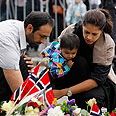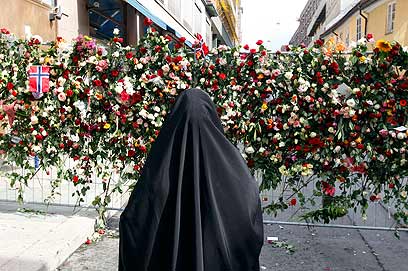
Oslo memorial
צילום: רויטרס
Norway Muslims share nation's grief
Community relieved to learn gunman behind nation's most heinous crimes not a fellow Muslim; hopes atrocities lead to better future for race relations
Oslo was still reeling from Norway's worst massacre in modern history as the victims' identities slowly began to emerge Wednesday, replacing numbers with names and faces.
The nation's sizeable Muslim community is also grieving, and no one denies the relief felt upon discovering that the perpetrator of one of the country's most heinous crimes was far-right Norwegian zealot Anders Behring Breivik, and not a fellow Muslim.
- Receive Ynetnews updates directly to your desktop
In a recent memorial rally held in Oslo, a blond man in the grieving crowd asked Iraqi-born Iman al-Kofi, wearing a headscarf, for a hug.
Kofi, who had a friend in intensive care with three bullet wounds and had learned that at least one other friend of Iraqi origin had been killed in Friday's massacre by an anti-Islamic extremist, obliged, and the man walked back into the crowd without another word.
Kofi, 19, and other Muslim immigrants say they would have been treated very differently had it been found that a fellow Muslim was behind the killing spree.
"If it was a Muslim, they would blame all foreigners and hate us all," she said, adding that she had come to Oslo to grieve with the tens of thousands of others who converged on the Norwegian capital on Monday to pay their respects to the dead.
Muslims in Norway said they shared the pain of their Christian compatriots after the massacre. Norwegians of all backgrounds united to condemn Breivik's actions and views, and Muslim leaders said they hoped the atrocities would lead to a better future for race relations.

The victims (Screenshot: Dagbladet)
Muslims said they felt relief that the rising tide of anti-immigrant and anti-Muslim sentiment in Europe had not been given fresh momentum by another Muslim killing innocent people in the name of Islam.
"We thought 'Praise God it wasn't a Muslim'," said Algerian immigrant Mahmoud Tariq, 23, who was at an Oslo mosque when its windows were blown open by the bomb Breivik had planted.
"I have a big hope that this will change Norway in a positive direction. Everyone is united, regardless of color, cultural background, and ethnicity. We are all affected, we are all wounded," said Najeeb Ur Rehman Naz, a prominent Imam based in Norway.
Foreign Minister Jonas Gahr Store is due to attend a mosque ceremony for Breivik's victims.
Norway's opposition Progress Party has grown in power in recent years, partly through its tough stance on immigration.
"It was a relief to find out he wasn't a Muslim, but at the same time he had a message, it was against Muslims and it was not good," said Zohra Abdullah, 28, horrified that the extremist violence she had fled in Afghanistan had followed her to Norway.
A better future
Rightist parties in neighboring countries, such as the anti-immigration Sweden Democrats party, now in parliament for the first time, have heightened their rhetoric against Muslims, painting Islam as backward and incompatible with Western or Scandinavian values."You could have seen it coming. Some people say it was just a matter of time, but I was shocked by the degree to which it happened," said a Muslim member of Norway's police force who declined to be named.

Grieving with all of Oslo (Photo: Reuters)
Rim Chawwa, a Palestinian refugee facility director, said that while she had come across Norwegians with far-right views, such incidences were rare and Norwegians should not all be judged by the actions and views of a few extremists.
"Some people have a view that Muslims are extremists and violent. It turns out that terrorism doesn't have a nationality or a religion – they're people who are sick inside," she said.
"It shows that if an Arab or Muslim does this, it doesn't mean all of us have these views," she added.
Norway's Muslim leaders were hopeful for the future, seeing Breivik's violent call for Europe to shun Muslims as actually more likely to bring Muslims and Christians together.
"I think minorities will think of themselves as more Norwegian ... religion, ethnicity, color will go into the background. The Norwegian identity will be strengthened," said Mehtab Afsar, Islamic Council of Norway general-secretary.
"We are standing shoulder to shoulder with our Christian brothers and sisters in Norway," he added.
"In the short term, the parties are not going to touch the immigration issue ... I think it's going to make politicians quite cautious in their wording, their rhetoric," said Hanne Marthe Narud, political science professor at Oslo University.
"In a time of tragedy, voters normally flock around the established parties, particularly those in office. The Labor Party has been particularly harmed by this, and the way the prime minister has acted is extremely good. His popularity will spill over to the Labor Party," she added.
- Follow Ynetnews on Facebook










